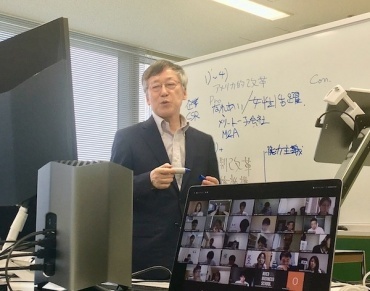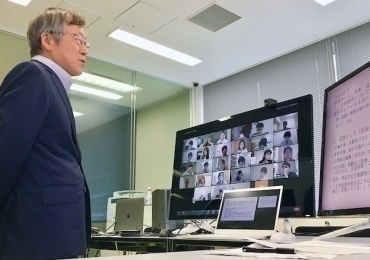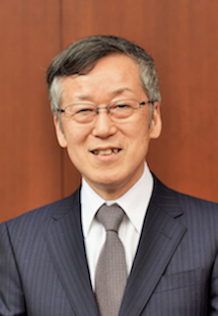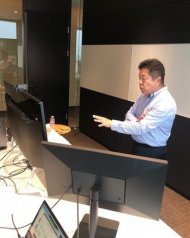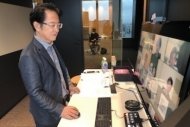Tax Policy and the Economy" by Professor Yasushi Harada, who joined our faculty in April 2020, is now offered virtually at our Tokyo campus studio.
In this class, we will take a look at taxation and government spending in Japan, understand the problems with each, and consider what kind of administrative and fiscal reforms are needed to develop the Japanese economy. Students will learn to have a deeper awareness of the issues in light of international comparisons and common sense in business management, rather than conventional discussions.
Did you know that there is a case study created by Harvard Business School in 1999 called "Japan: Free, Fair and Global? In fact, not only corporations but also nations can be depicted as cases, because both corporations and nations share the sense of managing groups and organizations.
The case method is an educational method for training practitioners. Facilitating and guiding students to the learning goals set by the case method requires a great deal of knowledge and experience on the part of the instructor, even when examining a specific "company. Because the theme of the "nation" case is so broad, one wrong move can lead to a catastrophic collapse of the discussion, as the discussion ends up being an abstract argument with no clear point to grasp. In fact, there are only a handful of teachers in the world who can choose "the nation" as a case study to use in their classes, let alone facilitate it based on their own experience. Professor Yasushi Harada, a former member of the Bank of Japan's Policy Board, is one of those "very few" teachers.
The case of "Japan: Free, Fair and Global?" depicts Japan in the era of Hashimoto's administrative reforms around 1998, focusing on economic policy (yen appreciation), labor market, bureaucratic power, corporate governance, and social issues (aging, women's activities, education). Professor Yasushi Harada carefully discusses with the students one by one about the bank-led capitalist system, liquidity of the labor market, small government or big government, cross-shareholdings, the percentage of women going to school and the percentage of women in managerial positions. He also touched on the social thought and philosophy of wise men such as Friedman, Hayek, Nozick, and Rawls, and encouraged the students to understand the importance of having a deeper awareness of issues regarding the development of Japan (economy and society) from both theoretical and practical perspectives.
Students enrolled in the Tax Accountant Training Program of the Graduate School of Accounting and Finance, where this class is held, aim to become tax accountants or CFOs (Chief Financial Officers) of companies after completing graduate school. Through discussions with Professor Yasushi Harada, the students will become professionals and leaders of the next generation who can contribute to the development of Japan (economy and society) by thinking about "tax" from a global and macroscopic perspective, using perspectives such as national finances, policy, and wealth redistribution, rather than merely possessing specialized knowledge of "tax" and "law. The students seemed to have a growing awareness of their goal to become professionals and next-generation leaders who can contribute to the development of Japan (economy and society).

 Brochure
Brochure
 Info Session
Info Session
 Application
Application
 Alumni Voices
Alumni Voices




